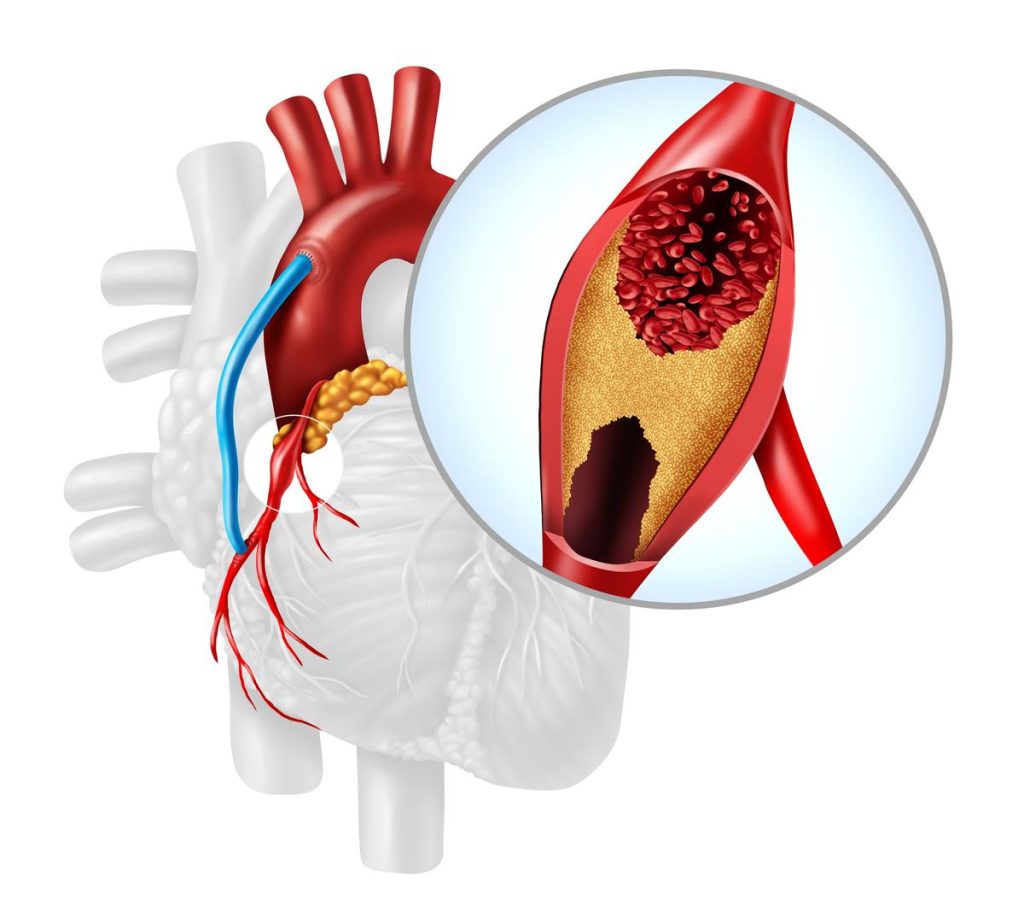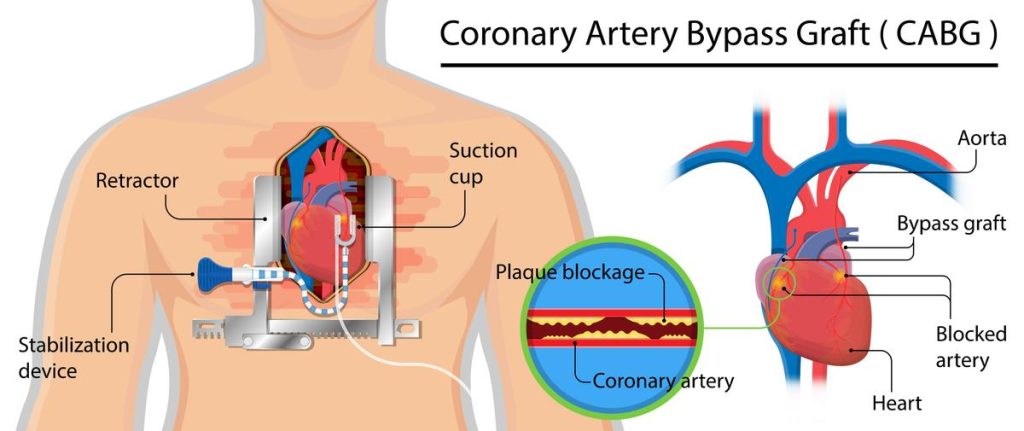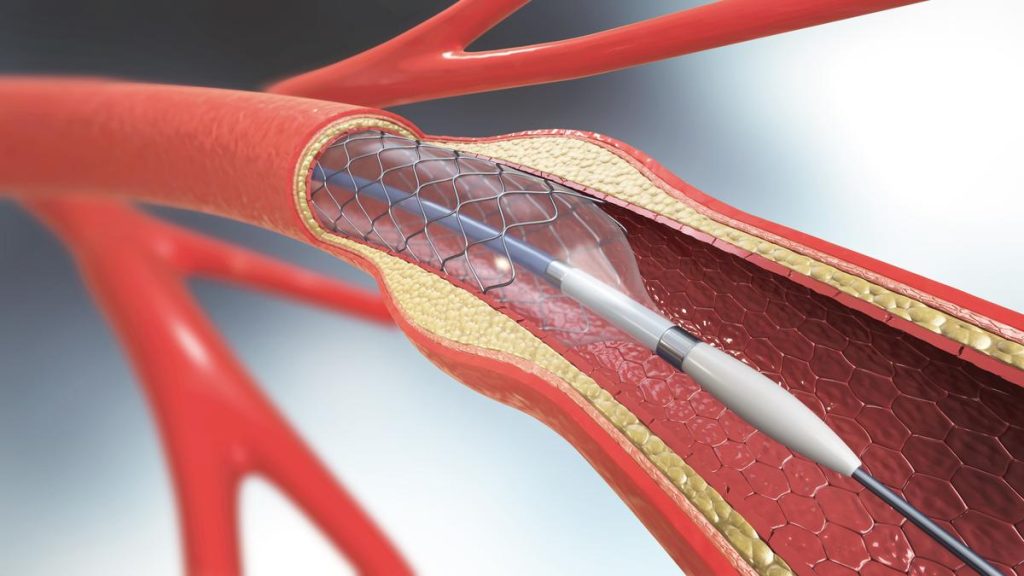Coronary Artery Bypass Surgery
Coronary artery bypass grafting (CABG), which is also referred to as heart bypass surgery, is a medical procedure aimed at reestablishing blood circulation to specific regions of the heart. When arteries become obstructed, it impedes the flow of blood, potentially leading to heart attacks or symptoms similar to those experienced during a heart attack. To restore blood flow, CABG utilizes blood vessels from different areas of the body to create an alternative path around the blockages.

Why it’s done
Coronary artery bypass surgery is performed to reinstate the circulation of blood around a congested heart artery. This procedure is carried out in cases of emergency, especially when other immediate medical options have proven ineffective in treating a heart attack.
If you are recommended coronary artery bypass surgery by your healthcare provider, it might mean that you have:
- There is an obstruction in the artery that supplies a significant amount of blood to the muscle of the heart.
- The main artery of the heart is experiencing a significant reduction in size.
- Severe chest pain arises due to the constriction of multiple arteries in the heart, leading to a decrease in blood flow to the heart, occurring even during mild physical activity or while at rest.
- Your lower left heart chamber is not functioning properly when multiple heart arteries are diseased.
- A heart artery that is obstructed and cannot be addressed through coronary angioplasty. This minimally invasive procedure involves using a catheter, a thin tube with a balloon attached to its end, to expand the artery. Usually, a small coil known as a stent is employed to maintain the artery in an open state.
- A failed angioplasty procedure, with or without the use of a stent. For instance, the artery became narrowed once more following the stenting.
The benefits of bypass surgery
Coronary artery bypass surgery enhances blood circulation to the heart muscles, thereby lessening the symptoms associated with coronary heart disease.
Over time, you might experience improved health and increased ability to engage in physical activities compared to your pre-surgery state. Additionally, the chances of encountering future heart issues will decrease. Ensuring long-term cardiac well-being is crucial. Although a bypass procedure can rectify blood flow to the heart, there is still a possibility for plaque formation in the arteries.

What should I do before heart bypass surgery?
Prior to undergoing heart bypass surgery, individuals ought to:
- stop smoking immediately, if applicable
- Have a conversation with the surgeon about which medications should be kept or stopped.
- make arrangements for someone to accompany them upon their arrival at their residence
- Refrain from consuming any food or beverages after midnight the night prior to your surgery.
- Abide by any additional directions given by the doctor or healthcare team.
Before a person undergoes a scheduled heart bypass surgery, they will have the chance to have a conversation with their doctor about the procedure. The medical team will provide a thorough explanation of the surgery, determine the time of arrival, and assist in filling out any necessary paperwork.
Prior to the surgery, the individuals will be evaluated through various tests such as an electrocardiogram (EKG), chest X-ray, and blood tests. Additionally, nurses will insert an intravenous (IV) line into the person’s arm, enabling the administration of necessary fluids and medications.
One of the healthcare team members might be responsible for shaving the specific areas where the surgeon will perform their incisions.
What happens during Coronary Artery Bypass Surgery?

Prior to the procedure, you will be administered general anesthesia, which will induce sleep. The anesthesia is either injected or inhaled through a mask. An anesthesiologist, a specialized doctor, will administer the anesthesia before the surgery commences and will remain present to monitor and ensure that you remain asleep throughout the procedure.
Afterwards, you will proceed to the surgical room where the procedure will typically take three to six hours. The surgeons commonly create an incision along the center of the breastbone, allowing access to the heart. Additionally, if there is a need for a vein graft from the leg or an artery graft from the arm, smaller incisions will be made in these respective areas as well.
During a heart surgery, a heart-lung bypass machine will be utilized to circulate the blood throughout your body as the surgeon works on your heart. However, in certain cases, surgeons may opt for a different approach known as beating heart surgery, where they perform coronary bypass operations without the use of this machine.
Your doctor might perform more recent types of bypass surgeries such as endoscopic or minimally invasive procedures. These methods involve making multiple small incisions and utilizing an endoscope camera to visualize the blood vessels and heart. Surgeons choose these techniques to assist in getting you out of bed earlier and hastening the recovery process.
If your surgeon has to make an incision on your breastbone, you will have a surgical wound running down the center of your chest. It is natural to feel anxious or frightened about having visible scars post-surgery, but remember that many others have undergone heart surgery and have found a way to embrace their scars. Take the time to hear their stories and learn from their experiences.
Before and after the surgery, your surgeon will be available to address any inquiries you may have. This encompasses discussing the various surgical options that are suitable for you.

After the procedure
After undergoing coronary artery bypass surgery, a group of medical professionals will assess your condition and ensure that you are as comfortable as possible. It is common to experience soreness and disorientation upon awakening. The following occurrences can typically be anticipated:
- The breathing tube will remain in your throat until you regain consciousness and are able to breathe independently.
- When you undergo coronary artery bypass surgery, it is typical to spend approximately one to two days in the intensive care unit of a hospital. The overall duration of your hospital stay will vary based on your recovery progress and the occurrence of any complications. It is common for certain individuals to be discharged and return home within a week following the surgery.
- Monitoring of heart rate and respiration. Post-surgery, your medical team closely observes you to detect any potential problems. Machines are utilized to record your breathing pattern and heart rate. Additionally, your body temperature is checked regularly.
- Medication is administered through an intravenous (IV) to help alleviate pain and avoid potential complications like blood clots. If you do not currently take a daily aspirin, your healthcare provider might suggest incorporating it into your routine. It is possible that you may need to consistently take aspirin for the rest of your life. There are specific medical guidelines on who can benefit from aspirin therapy, so it is essential to discuss its usage with your healthcare provider.
- Cardiac rehabilitation, commonly known as cardiac rehab, is a monitored program that combines education, counseling, and physical exercise to enhance the well-being of the heart following surgical procedures. From the time you are in the hospital, you will be motivated to engage in light movements and walking. Upon discharge, you will continue the cardiac rehab program at a medical facility until you can confidently transition to a home-based program.
Success rate
Heart bypass surgeries, although a significant procedure, are generally considered to be low-risk. Typically, the results of this surgery are favorable as it effectively alleviates symptoms caused by blocked arteries and enhances one’s overall well-being.
What is the recovery time?
It usually takes several weeks for individuals undergoing CABG to completely recover. During this period, healthcare professionals will recommend avoiding physically demanding activities or situations that could put excessive strain on the heart and incisions.
The person who is responsible for your healthcare is the most qualified individual to inform you about the estimated duration for your recovery and what you should anticipate during this period. They will also guide you on when you can begin to reintegrate your usual activities such as work, exercise, driving, and more.
Treatment in Türkiye:
The medical staff of surgical teams, doctors and consultants in Rehab Türk can provide the best treatment options and free consultations – by striving to keep abreast of the latest medical technologies and methods.
